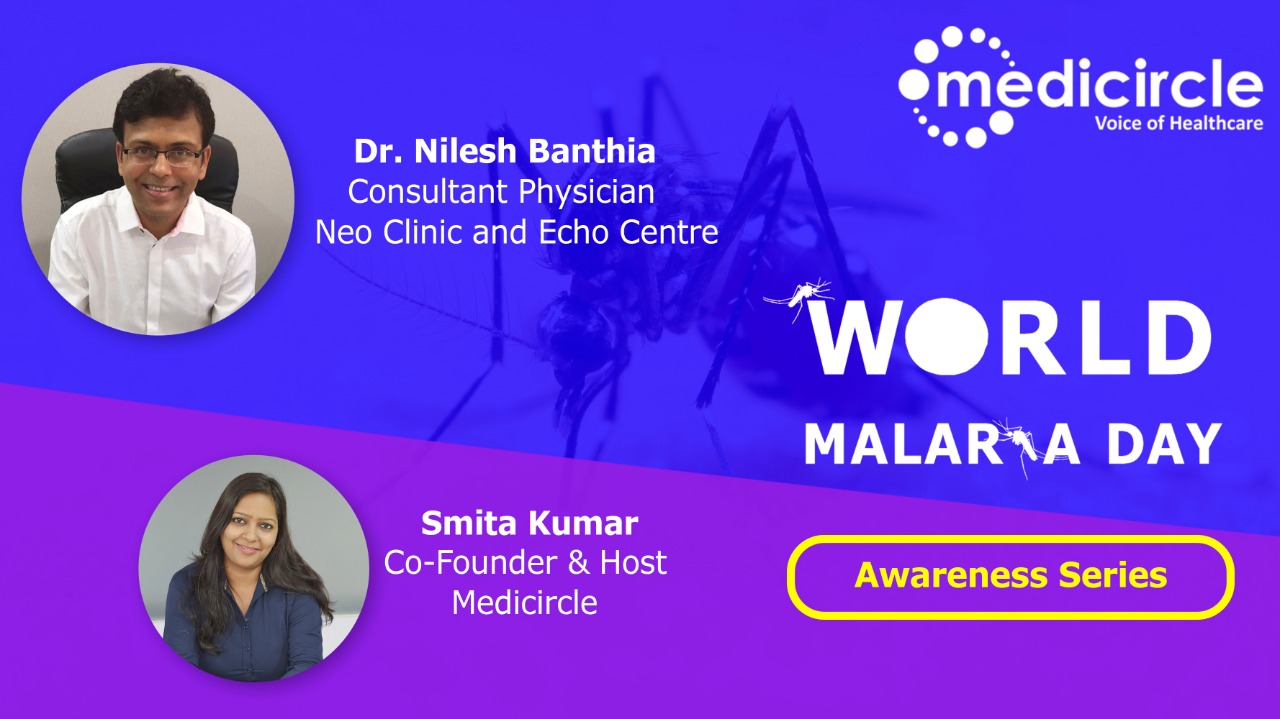World Malaria Day is observed annually on 25th April to bring global attention to the efforts being made to end malaria and bring about a change to eradicate malaria completely. The World Health Organization has noted impressive gains by India in their fight against malaria. According to the WHO report, most malaria prevention campaigns were able to move forward this year without any delays in spite of the COVID19 pandemic. India recorded the largest reduction in malaria cases in Southeast Asia from 2000-2019. India has contributed to the largest drop in cases nationwide from 20 million to 6 million. In Spite of outstanding achievement by India in cases of Malaria, strict intervention is needed to eradicate malaria completely from India to zero cases.
At Medicircle, we are conducting an awareness series on Malaria with eminent doctors for the World Malaria Awareness to boost awareness and educate people about the prevention of Malaria
Dr. Nilesh Banthia is an MBBS, DNB(General Medicine). He is also awarded Membership of the National Academy of Medical Sciences (M.N.A.M.S). Dr. Banthia is an independent Medical Practice Professional Doctor with having speciality and expertise in Consulting physicians. He is known for his expertise and excellent patient care. He has attended many international seminars and conferences. He is a member of various international and medical healthcare organizations.
Importance of completing antimalarial treatment
Dr. Nilesh Banthia says, “It is important to complete the course of anti-malaria treatment. Inadequate or incomplete treatment can cause the remaining malarial parasites to multiply in the body. Plasmodium vivax species of malaria remain dormant in the liver many times for about 1.5 months and this may cause reinfection by entering the blood causing fever and malaria symptoms. Initial treatment for the first 5 days is a must for the malarial patient. There is a medicine called Primaquine which is generally prescribed during the anti-malarial treatment course to kill the dominant malarial parasites. It is important to consume this medicine and complete the course of treatment to eradicate malaria and reinfection.
Effective treatment for malaria
Dr.Banthia informs, “The primary treatment used for malaria was the quinine which is available in tablets as well as injectable forms. This medicine “quinine” had no side effects. Many new medicines are now available for antimalarial treatment without any side effects. There are Artemisinin drugs available that are extracted from Chinese herbs and very effective in treating patients suffering from malaria. It is important to take a 5 days course of antimalarial treatment and then continue with prophylactic treatment for the same. There are preventive medicines for malaria also available today. Malaria mostly affects during the rainy season. Taking chloroquine once a week can be effective to prevent malaria.
Medicines for the anti-malaria treatment
Dr. Banthia explains, “The most common antimalarial medicine is chloroquine. ICMR has been informed that chloroquine is effective for COVID as per their guidelines to some extent during the initial stages. However, chloroquine is not considered to be effective to treat COVID cases. HCQS or chloroquine was initially used as a prophylactic medicine for COVID but as per the findings, it is not in use now.”
Difference between malarial fever and COVID fever
Dr.Banthia states, “The most important symptoms of malaria are fever with chills with high temperature with definite patterns on alternate days. People suffering from COVID, on the other hand, have a mild continuous fever with no chills. Headache is persistent and significant in malaria whereas COVID shows symptoms of respiratory tract causing cough and cold. High-temperature fever of 105 degrees is typical of malarial fever and helps in distinguishing from COVID.”
Prevention of malaria during the rainy season
Dr.Banthia informs, “ Tips to prevent malaria during the rainy season are as follows:
- Cover yourself to avoid mosquito bites
- Using insect repellants
- Shut windows and doors in the evening to avoid mosquito entry
- Use mosquito repellent coils which can help
- Hygiene is very important to avoid mosquito”
Difference between dengue fever and malarial fever
Dr.Banthia explains, “Dengue fever is similar to malarial fever. It is important to carry out blood investigations to differentiate between the two. Treatment is important for both the conditions to avoid the complications.”
(Edited by Dr.Rati Parwani)

 Dr. Nilesh Banthia gives his valuable advice and informs that it is important to complete an anti malarial treatment course to prevent reinfection of malaria. With his expertise, he explains the real difference between different types of fever.
Dr. Nilesh Banthia gives his valuable advice and informs that it is important to complete an anti malarial treatment course to prevent reinfection of malaria. With his expertise, he explains the real difference between different types of fever. 









.jpeg)






.jpeg)

.jpg)





.png)




